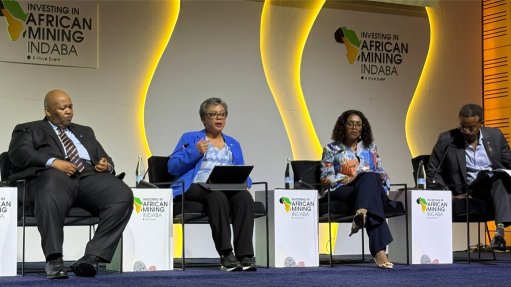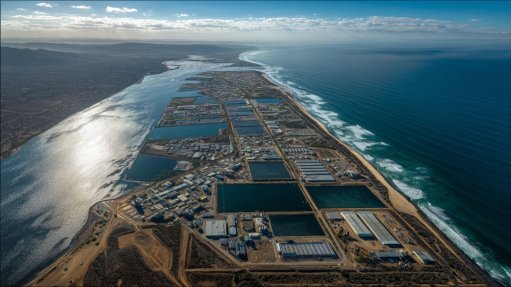Widespread relief expressed as South Africa removed from FATF grey list
Various organisations, government entities and economic commentators have welcomed global money laundering and terrorist financing watchdog the Financial Action Task Force's (FATF’s) decision to remove South Africa from its grey list of jurisdictions under increased monitoring.
Operation Phumelela, the Banking Association South Africa (Basa), Business For South Africa (B4SA), Business Leadership South Africa (BLSA), Business Against Crime South Africa (Bacsa), the National Treasury and others have called this a crucial moment in South Africa’s journey towards achieving financial transparency and integrity.
Basa said business and investor confidence in South Africa should receive a much-needed boost from the removal of South Africa from the FATF’s list of countries that have strategic deficiencies in their ability to counter money laundering, as well as terrorist and proliferation financing.
“The integrity and effective regulation of the South African financial services sector is an advantage for the country as it competes to attract international investment. The FATF decision is an important data point for those who are looking for concrete evidence that South Africa can remove obstacles hampering business and investment through action, not only policy announcements,” the organisation said.
North West University Business School economist Professor Raymond Parsons agreed that it was good news for South Africa’s economy.
“This is a confidence-building factor at a critical time in our business cycle. While the markets will have already priced in the prospect that the FATF would make the decision, it nonetheless marks South Africa crossing a key threshold in financial reform.
“Being off the grey list also eliminates one important element of policy uncertainty that is keeping the NWU Business School’s Policy Uncertainty Index in negative territory,” he said.
Parsons noted that the removal from the grey list would help to improve investor confidence and reduce the costs associated with overseas financial transactions.
“By complying with global standards, it also demonstrates the progress that South Africa has made in dealing with money laundering and terror financing. It signals that, if the necessary effort and political will is effectively mobilised behind a key reform, it is possible to achieve positive outcomes quite rapidly,” he said.
South Africa’s removal comes after two years and eight months of reforms, in which 22 action items identified by the FATF had to be addressed.
"This is a watershed moment for South Africa's financial sector and economy. Exiting the FATF grey list restores confidence in our financial system, strengthens our position as a leading African financial hub and reaffirms our commitment to global standards of financial integrity,” JSE CEO and Operation Phumelela chairperson Leila Fourie said.
Following the listing of South Africa on the FATF grey list in February 2023, South African officials and economic leaders met regularly with a team of reviewers assigned by the FATF to assess progress against the 22 action items.
The National Treasury confirmed that this culminated in an on-site visit at the end of July, when FATF assessors came to the country to confirm the sustainability of the reforms that had been reported to them.
This concluded in a meeting with Deputy Finance Minister David Masondo and Deputy Justice and Constitutional Development Minister Andries Nel, who assured the FATF of the South African government’s political commitment to continue to sustainably improving the country’s Anti-Money Laundering and the Combatting the Financing of Terrorism (AML/CFT) system.
“While exiting the grey list is an important milestone and a demonstration of South Africa’s commitment to rebuilding the rule of law, it is only [the] start of a broader process to continue to strengthen key institutions, improve enforcement and governance processes and ensure that such improvements are sustainable and that our systems become increasingly effective in combating money laundering, terrorism financing and proliferation financing.
“Neither government agencies nor regulated entities in the private sector can afford to become complacent and stop improving. Instead, through public-private collaboration, they must continue to strengthen the AML/CFT system,” the National Treasury said in a statement.
Basa added that the effectiveness and integrity of South Africa’s law enforcement agencies must be quickly and decisively restored to deal with concerns that the country is in danger of becoming a criminal State.
“The FATF announcement that South Africa has improved its capacity to fight financial crime is an achievement, at a time when confidence in the country’s law enforcement is being challenged by evidence being presented at Parliamentary hearings and the Madlanga Commission of Enquiry into allegations of criminality, political interference, and corruption in the criminal justice system,” Basa added.
While South Africa has been removed from the grey list, its capacity to fight financial crime will continue to be monitored and evaluated by the FATF. The country’s next FATF review begins in 2026.
BLSA CEO Busisiwe Mavuso pointed out that, when grey listing was a serious risk already in 2022, BLSA commissioned research showing the economic impact could range from less than 1% of GDP if the country reacted fast and credibly to 3% of GDP if South Africa was slow and unwilling to meet FATF standards.
“We warned that the reputational damage would be significant, including enhanced due diligence requirements for all transactions between South Africans and the rest of the world, potential loss of foreign banking relationships and reduced appetite for investment.
“The good news is that we have managed to keep the impact to the bottom end of that estimate, thanks to our determined and credible effort over the last 32 months . . . and earned our way off the list. This is no small feat, particularly given that several of these items required demonstrating sustained improvements over multiple reporting periods and genuine effectiveness, not just rules being changed but actually enforced,” Mavuso pointed out.
However, she said South Africa needed to be honest about why it found itself on the grey list in the first place.
“Grey listing was a consequence of the State capture era, which saw the deliberate undermining of commercial crime investigation and prosecution institutions. The FATF's concerns were one element of the price we paid for that destruction.
“The fact that we have now rebuilt these capabilities and in some cases built them beyond where they were before . . . shows what happens when we confront the consequences of State capture head-on rather than pretending they don't exist,” Mavuso said.
B4SA noted that, within the framework of the government-business partnership, the crime and corruption focal area continues to support these efforts, particularly in preparing for South Africa’s next FATF mutual evaluation in 2026 to ensure the country remains off the grey list. This work includes initiatives to strengthen the criminal justice system’s capacity to investigate and prosecute complex financial crimes.
“Through the South African Banking Risk Information Centre, business is assisting the Directorate for Priority Crime Investigation to strengthen its digital and financial investigation capacity, including awareness and training initiatives that enhance understanding of financial systems and transactions,” B4SA said.
ECONOMIC AND INVESTMENT IMPLICATIONS
The FATF grey listing has had significant adverse effects on South Africa's economy, including reputational damage affecting investor confidence, increased borrowing costs, reduced foreign direct investment and enhanced scrutiny of cross-border transactions.
South Africa’s exit from the FATF grey list is expected to restore the country's reputation in global financial markets, reduce transaction costs for South African businesses, attract increased foreign investment, lower sovereign borrowing costs and strengthen regional financial integration across Africa.
“This is an excellent outcome for South Africa. The initiatives under way to tackle crime and corruption are not only crucial for unlocking investment in the country, but are also meaningful to the lives of ordinary South Africans.
“There is more work to be done but what has been achieved so far again demonstrates the benefits that can be unlocked when the private and public sectors work together in the national interest,” Bacsa chairperson Neal Froneman said.
Nigeria, Mozambique and Burkina Faso were also removed from the FATF grey list this week.
Article Enquiry
Email Article
Save Article
Feedback
To advertise email advertising@creamermedia.co.za or click here
Press Office
Announcements
What's On
Subscribe to improve your user experience...
Option 1 (equivalent of R125 a month):
Receive a weekly copy of Creamer Media's Engineering News & Mining Weekly magazine
(print copy for those in South Africa and e-magazine for those outside of South Africa)
Receive daily email newsletters
Access to full search results
Access archive of magazine back copies
Access to Projects in Progress
Access to ONE Research Report of your choice in PDF format
Option 2 (equivalent of R375 a month):
All benefits from Option 1
PLUS
Access to Creamer Media's Research Channel Africa for ALL Research Reports, in PDF format, on various industrial and mining sectors
including Electricity; Water; Energy Transition; Hydrogen; Roads, Rail and Ports; Coal; Gold; Platinum; Battery Metals; etc.
Already a subscriber?
Forgotten your password?
Receive weekly copy of Creamer Media's Engineering News & Mining Weekly magazine (print copy for those in South Africa and e-magazine for those outside of South Africa)
➕
Recieve daily email newsletters
➕
Access to full search results
➕
Access archive of magazine back copies
➕
Access to Projects in Progress
➕
Access to ONE Research Report of your choice in PDF format
RESEARCH CHANNEL AFRICA
R4500 (equivalent of R375 a month)
SUBSCRIBEAll benefits from Option 1
➕
Access to Creamer Media's Research Channel Africa for ALL Research Reports on various industrial and mining sectors, in PDF format, including on:
Electricity
➕
Water
➕
Energy Transition
➕
Hydrogen
➕
Roads, Rail and Ports
➕
Coal
➕
Gold
➕
Platinum
➕
Battery Metals
➕
etc.
Receive all benefits from Option 1 or Option 2 delivered to numerous people at your company
➕
Multiple User names and Passwords for simultaneous log-ins
➕
Intranet integration access to all in your organisation





















